Enhancing Civil Engineering Projects: Listening, Feedback, Questioning
VerifiedAdded on 2023/06/12
|13
|2266
|138
Report
AI Summary
This report examines the crucial role of communication skills—listening, feedback, and questioning—in the success of civil engineering projects. It details the benefits of each skill, such as improved stakeholder relations, increased productivity, and effective problem-solving. The report also addresses the challenges to effective communication, including unsupportive organizational structures, lack of experience, and negative feedback. Recommendations are provided to enhance these skills, emphasizing the importance of active listening, constructive feedback, and skillful questioning. The conclusion underscores the necessity of incorporating these communication skills to foster collaboration, understanding, and overall project success in the field of civil engineering. Desklib provides access to this and other solved assignments.
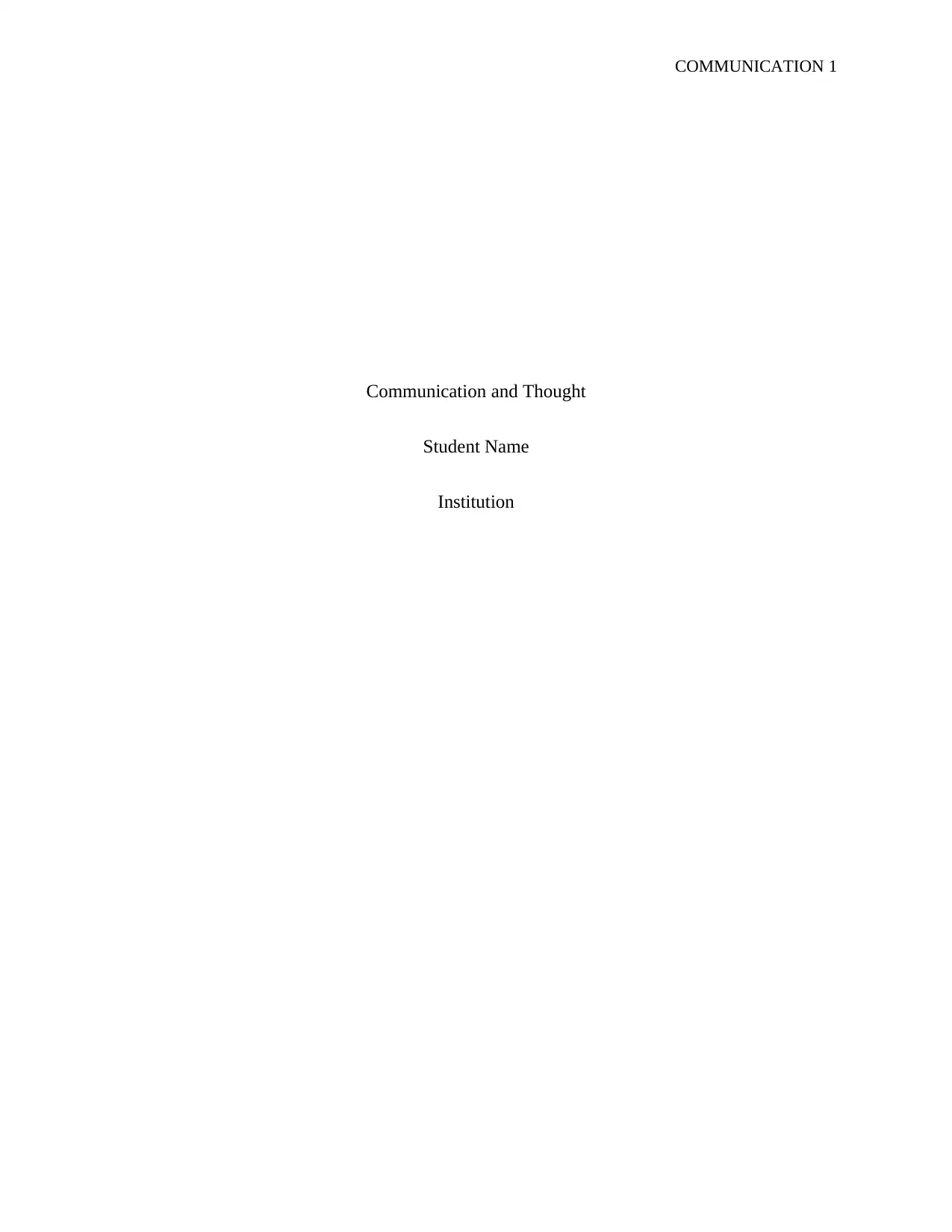
COMMUNICATION 1
Communication and Thought
Student Name
Institution
Communication and Thought
Student Name
Institution
Paraphrase This Document
Need a fresh take? Get an instant paraphrase of this document with our AI Paraphraser
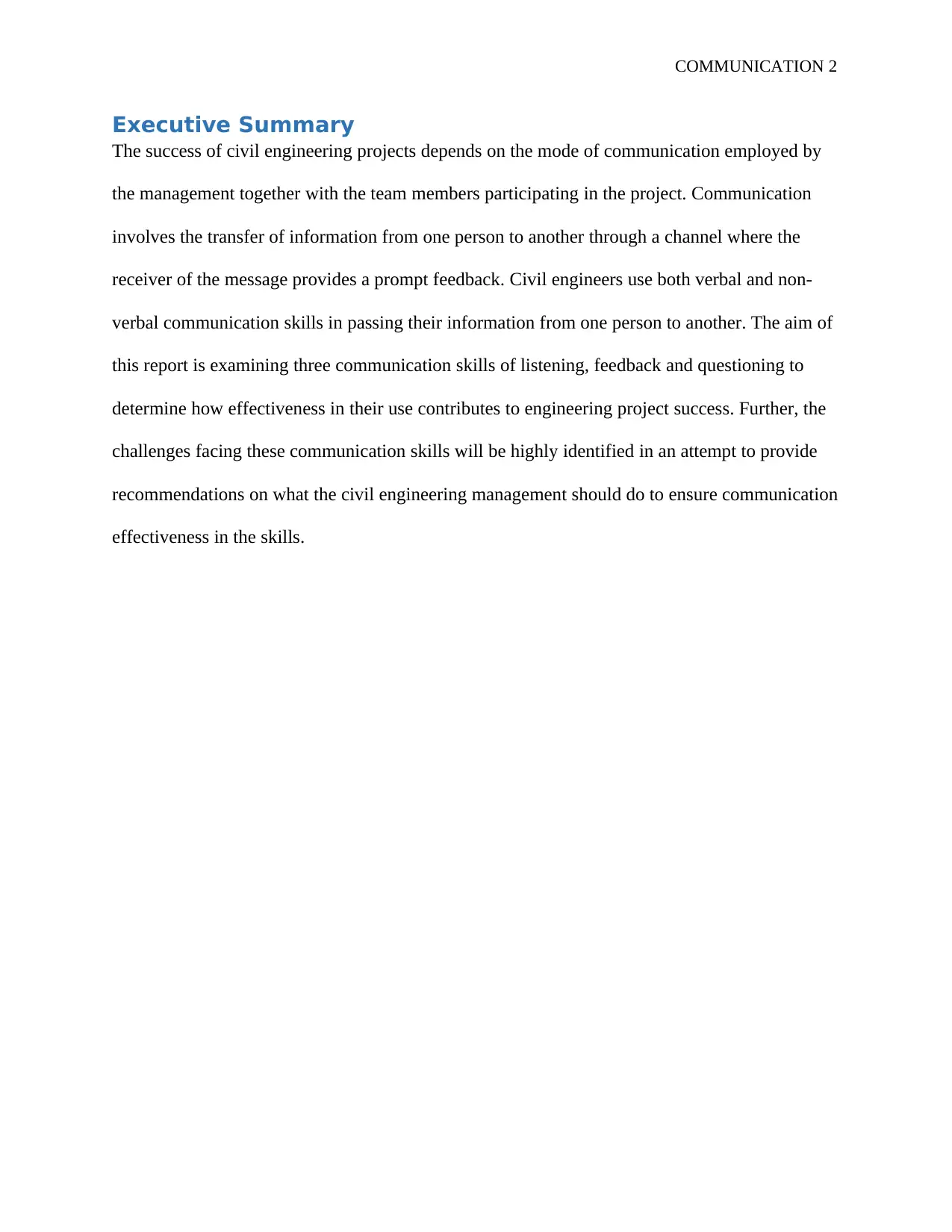
COMMUNICATION 2
Executive Summary
The success of civil engineering projects depends on the mode of communication employed by
the management together with the team members participating in the project. Communication
involves the transfer of information from one person to another through a channel where the
receiver of the message provides a prompt feedback. Civil engineers use both verbal and non-
verbal communication skills in passing their information from one person to another. The aim of
this report is examining three communication skills of listening, feedback and questioning to
determine how effectiveness in their use contributes to engineering project success. Further, the
challenges facing these communication skills will be highly identified in an attempt to provide
recommendations on what the civil engineering management should do to ensure communication
effectiveness in the skills.
Executive Summary
The success of civil engineering projects depends on the mode of communication employed by
the management together with the team members participating in the project. Communication
involves the transfer of information from one person to another through a channel where the
receiver of the message provides a prompt feedback. Civil engineers use both verbal and non-
verbal communication skills in passing their information from one person to another. The aim of
this report is examining three communication skills of listening, feedback and questioning to
determine how effectiveness in their use contributes to engineering project success. Further, the
challenges facing these communication skills will be highly identified in an attempt to provide
recommendations on what the civil engineering management should do to ensure communication
effectiveness in the skills.
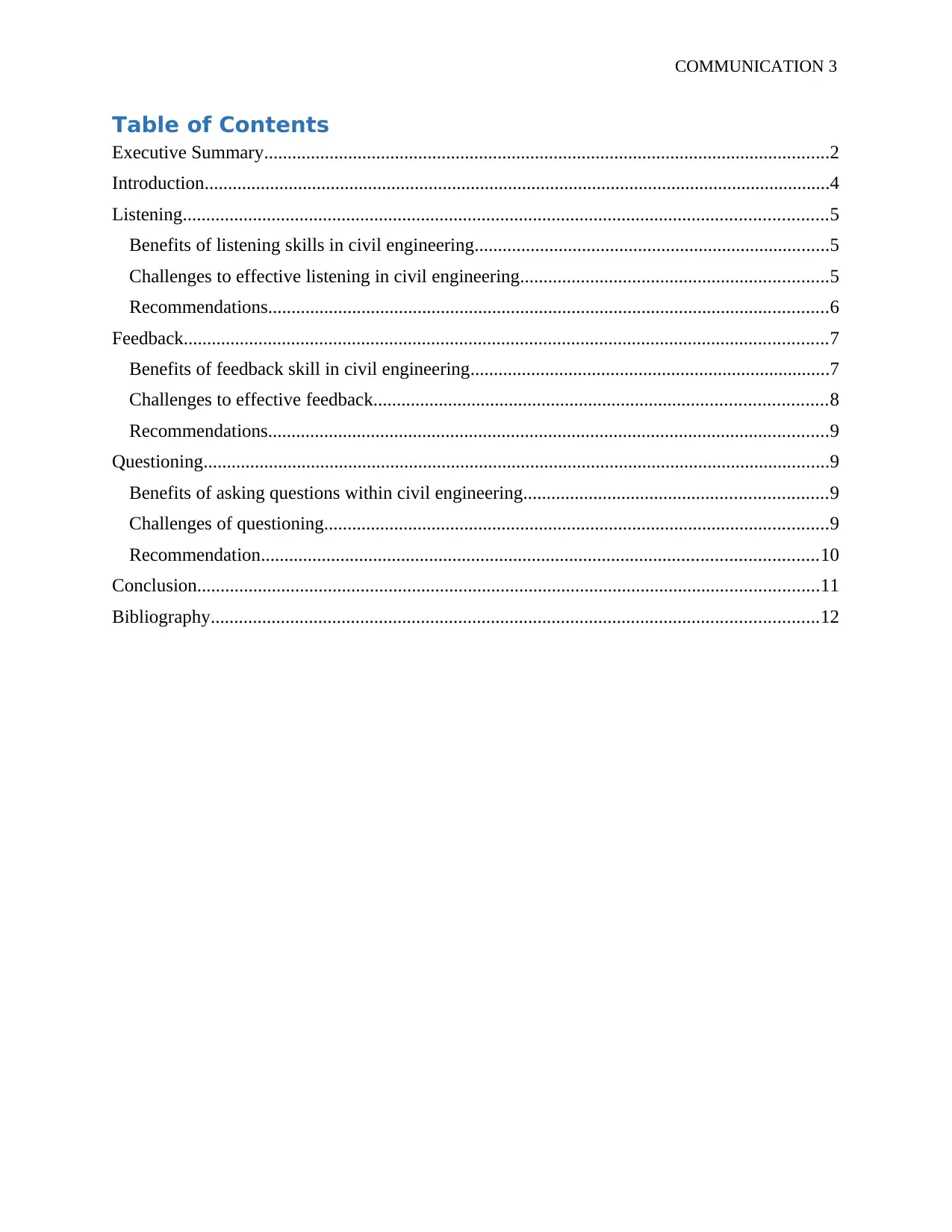
COMMUNICATION 3
Table of Contents
Executive Summary.........................................................................................................................2
Introduction......................................................................................................................................4
Listening..........................................................................................................................................5
Benefits of listening skills in civil engineering............................................................................5
Challenges to effective listening in civil engineering..................................................................5
Recommendations........................................................................................................................6
Feedback..........................................................................................................................................7
Benefits of feedback skill in civil engineering.............................................................................7
Challenges to effective feedback.................................................................................................8
Recommendations........................................................................................................................9
Questioning......................................................................................................................................9
Benefits of asking questions within civil engineering.................................................................9
Challenges of questioning............................................................................................................9
Recommendation.......................................................................................................................10
Conclusion.....................................................................................................................................11
Bibliography..................................................................................................................................12
Table of Contents
Executive Summary.........................................................................................................................2
Introduction......................................................................................................................................4
Listening..........................................................................................................................................5
Benefits of listening skills in civil engineering............................................................................5
Challenges to effective listening in civil engineering..................................................................5
Recommendations........................................................................................................................6
Feedback..........................................................................................................................................7
Benefits of feedback skill in civil engineering.............................................................................7
Challenges to effective feedback.................................................................................................8
Recommendations........................................................................................................................9
Questioning......................................................................................................................................9
Benefits of asking questions within civil engineering.................................................................9
Challenges of questioning............................................................................................................9
Recommendation.......................................................................................................................10
Conclusion.....................................................................................................................................11
Bibliography..................................................................................................................................12
⊘ This is a preview!⊘
Do you want full access?
Subscribe today to unlock all pages.

Trusted by 1+ million students worldwide
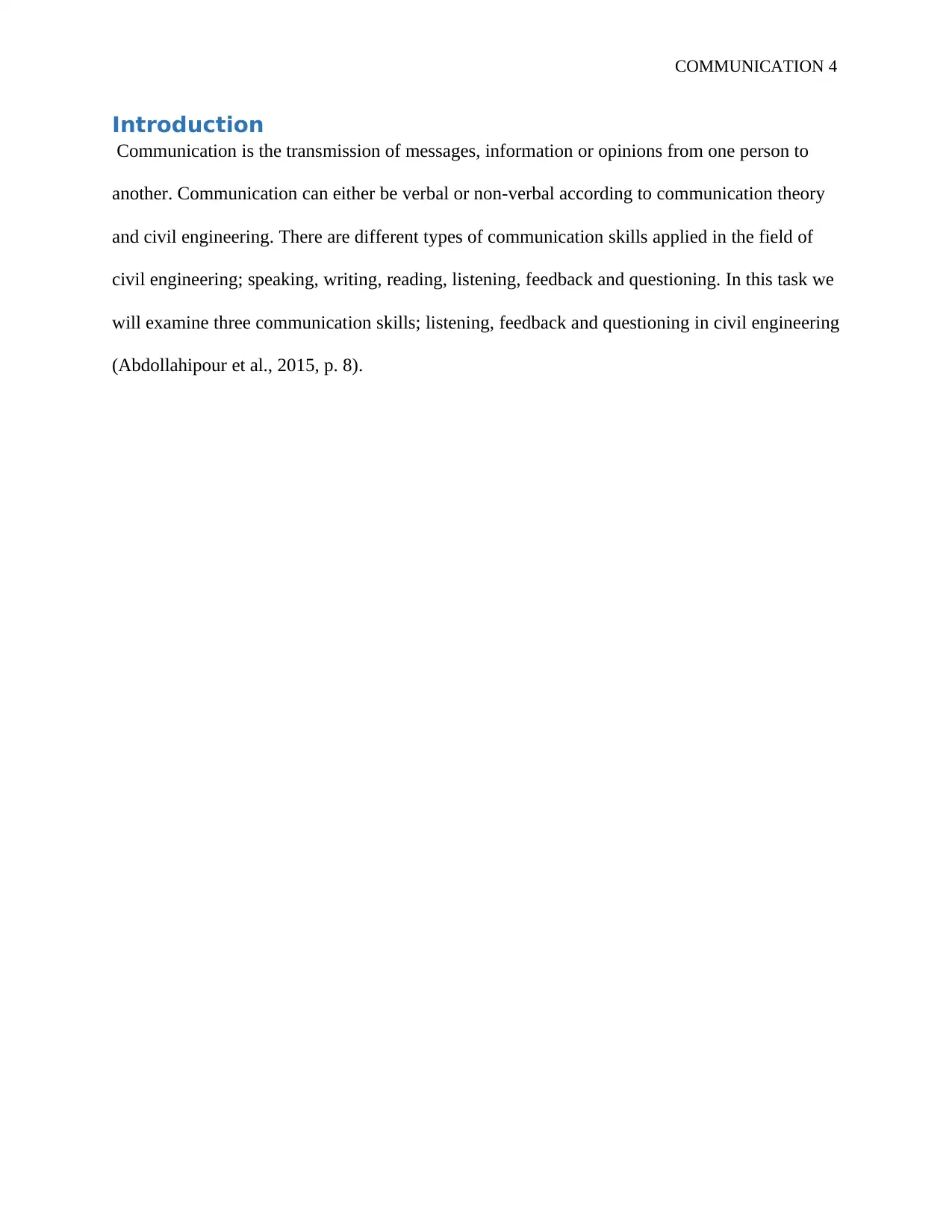
COMMUNICATION 4
Introduction
Communication is the transmission of messages, information or opinions from one person to
another. Communication can either be verbal or non-verbal according to communication theory
and civil engineering. There are different types of communication skills applied in the field of
civil engineering; speaking, writing, reading, listening, feedback and questioning. In this task we
will examine three communication skills; listening, feedback and questioning in civil engineering
(Abdollahipour et al., 2015, p. 8).
Introduction
Communication is the transmission of messages, information or opinions from one person to
another. Communication can either be verbal or non-verbal according to communication theory
and civil engineering. There are different types of communication skills applied in the field of
civil engineering; speaking, writing, reading, listening, feedback and questioning. In this task we
will examine three communication skills; listening, feedback and questioning in civil engineering
(Abdollahipour et al., 2015, p. 8).
Paraphrase This Document
Need a fresh take? Get an instant paraphrase of this document with our AI Paraphraser
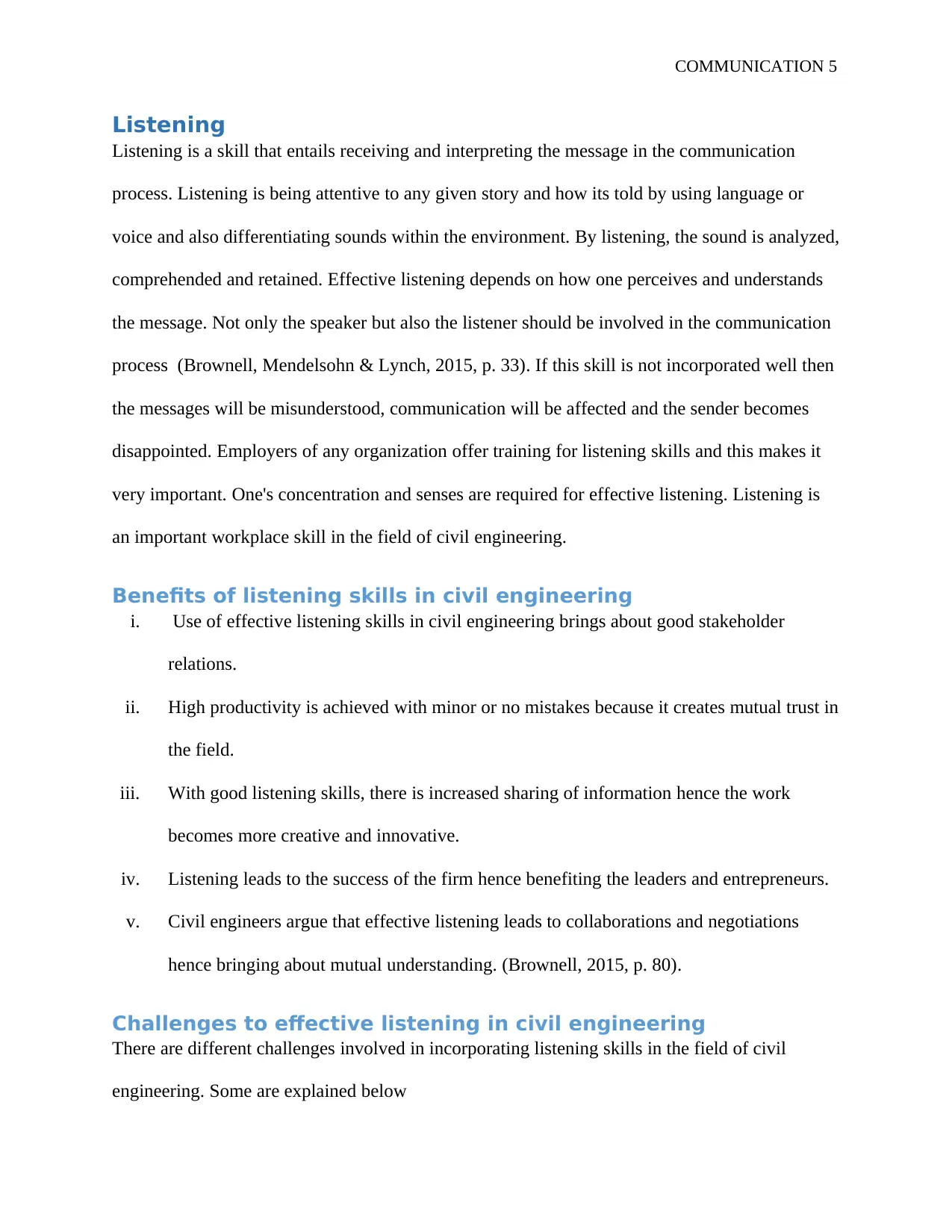
COMMUNICATION 5
Listening
Listening is a skill that entails receiving and interpreting the message in the communication
process. Listening is being attentive to any given story and how its told by using language or
voice and also differentiating sounds within the environment. By listening, the sound is analyzed,
comprehended and retained. Effective listening depends on how one perceives and understands
the message. Not only the speaker but also the listener should be involved in the communication
process (Brownell, Mendelsohn & Lynch, 2015, p. 33). If this skill is not incorporated well then
the messages will be misunderstood, communication will be affected and the sender becomes
disappointed. Employers of any organization offer training for listening skills and this makes it
very important. One's concentration and senses are required for effective listening. Listening is
an important workplace skill in the field of civil engineering.
Benefits of listening skills in civil engineering
i. Use of effective listening skills in civil engineering brings about good stakeholder
relations.
ii. High productivity is achieved with minor or no mistakes because it creates mutual trust in
the field.
iii. With good listening skills, there is increased sharing of information hence the work
becomes more creative and innovative.
iv. Listening leads to the success of the firm hence benefiting the leaders and entrepreneurs.
v. Civil engineers argue that effective listening leads to collaborations and negotiations
hence bringing about mutual understanding. (Brownell, 2015, p. 80).
Challenges to effective listening in civil engineering
There are different challenges involved in incorporating listening skills in the field of civil
engineering. Some are explained below
Listening
Listening is a skill that entails receiving and interpreting the message in the communication
process. Listening is being attentive to any given story and how its told by using language or
voice and also differentiating sounds within the environment. By listening, the sound is analyzed,
comprehended and retained. Effective listening depends on how one perceives and understands
the message. Not only the speaker but also the listener should be involved in the communication
process (Brownell, Mendelsohn & Lynch, 2015, p. 33). If this skill is not incorporated well then
the messages will be misunderstood, communication will be affected and the sender becomes
disappointed. Employers of any organization offer training for listening skills and this makes it
very important. One's concentration and senses are required for effective listening. Listening is
an important workplace skill in the field of civil engineering.
Benefits of listening skills in civil engineering
i. Use of effective listening skills in civil engineering brings about good stakeholder
relations.
ii. High productivity is achieved with minor or no mistakes because it creates mutual trust in
the field.
iii. With good listening skills, there is increased sharing of information hence the work
becomes more creative and innovative.
iv. Listening leads to the success of the firm hence benefiting the leaders and entrepreneurs.
v. Civil engineers argue that effective listening leads to collaborations and negotiations
hence bringing about mutual understanding. (Brownell, 2015, p. 80).
Challenges to effective listening in civil engineering
There are different challenges involved in incorporating listening skills in the field of civil
engineering. Some are explained below
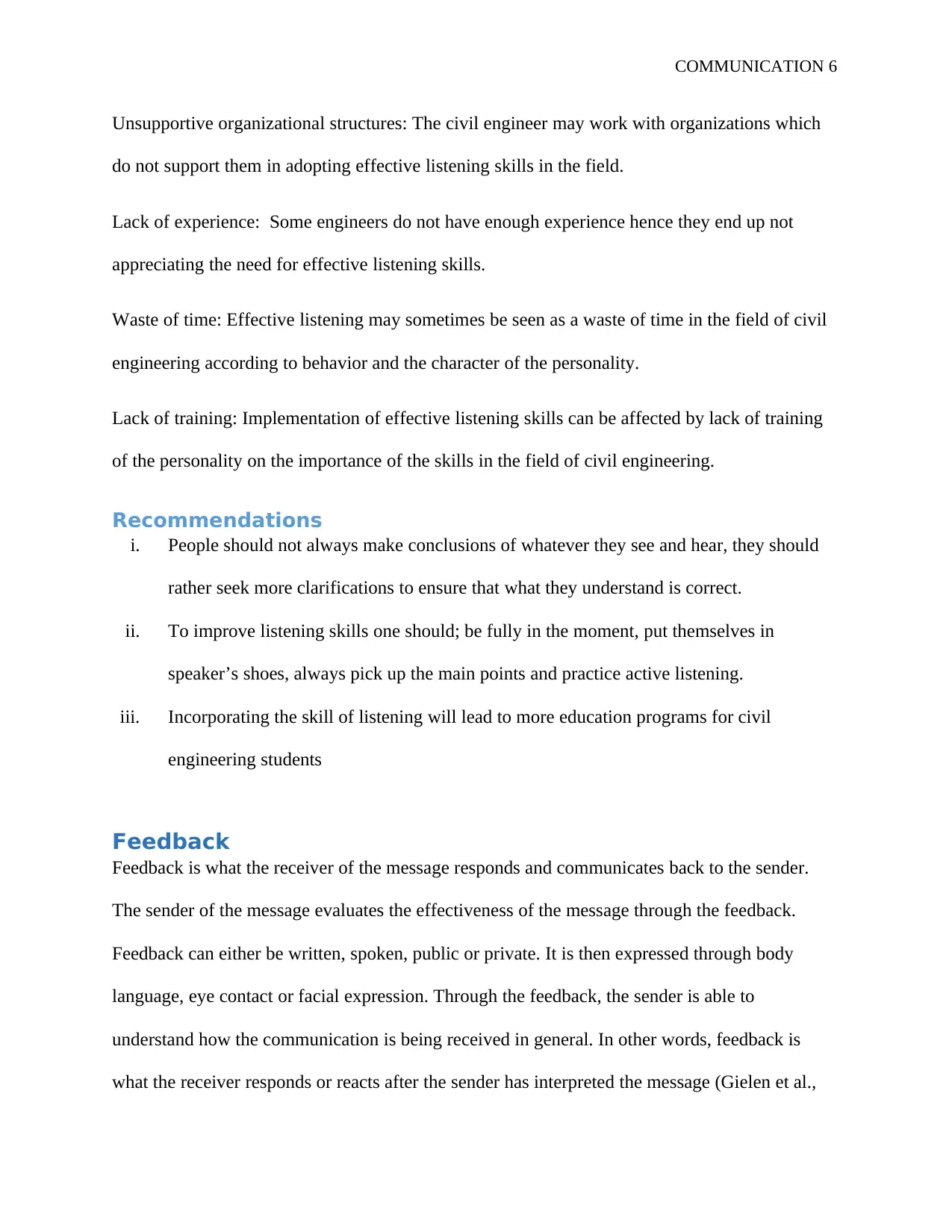
COMMUNICATION 6
Unsupportive organizational structures: The civil engineer may work with organizations which
do not support them in adopting effective listening skills in the field.
Lack of experience: Some engineers do not have enough experience hence they end up not
appreciating the need for effective listening skills.
Waste of time: Effective listening may sometimes be seen as a waste of time in the field of civil
engineering according to behavior and the character of the personality.
Lack of training: Implementation of effective listening skills can be affected by lack of training
of the personality on the importance of the skills in the field of civil engineering.
Recommendations
i. People should not always make conclusions of whatever they see and hear, they should
rather seek more clarifications to ensure that what they understand is correct.
ii. To improve listening skills one should; be fully in the moment, put themselves in
speaker’s shoes, always pick up the main points and practice active listening.
iii. Incorporating the skill of listening will lead to more education programs for civil
engineering students
Feedback
Feedback is what the receiver of the message responds and communicates back to the sender.
The sender of the message evaluates the effectiveness of the message through the feedback.
Feedback can either be written, spoken, public or private. It is then expressed through body
language, eye contact or facial expression. Through the feedback, the sender is able to
understand how the communication is being received in general. In other words, feedback is
what the receiver responds or reacts after the sender has interpreted the message (Gielen et al.,
Unsupportive organizational structures: The civil engineer may work with organizations which
do not support them in adopting effective listening skills in the field.
Lack of experience: Some engineers do not have enough experience hence they end up not
appreciating the need for effective listening skills.
Waste of time: Effective listening may sometimes be seen as a waste of time in the field of civil
engineering according to behavior and the character of the personality.
Lack of training: Implementation of effective listening skills can be affected by lack of training
of the personality on the importance of the skills in the field of civil engineering.
Recommendations
i. People should not always make conclusions of whatever they see and hear, they should
rather seek more clarifications to ensure that what they understand is correct.
ii. To improve listening skills one should; be fully in the moment, put themselves in
speaker’s shoes, always pick up the main points and practice active listening.
iii. Incorporating the skill of listening will lead to more education programs for civil
engineering students
Feedback
Feedback is what the receiver of the message responds and communicates back to the sender.
The sender of the message evaluates the effectiveness of the message through the feedback.
Feedback can either be written, spoken, public or private. It is then expressed through body
language, eye contact or facial expression. Through the feedback, the sender is able to
understand how the communication is being received in general. In other words, feedback is
what the receiver responds or reacts after the sender has interpreted the message (Gielen et al.,
⊘ This is a preview!⊘
Do you want full access?
Subscribe today to unlock all pages.

Trusted by 1+ million students worldwide
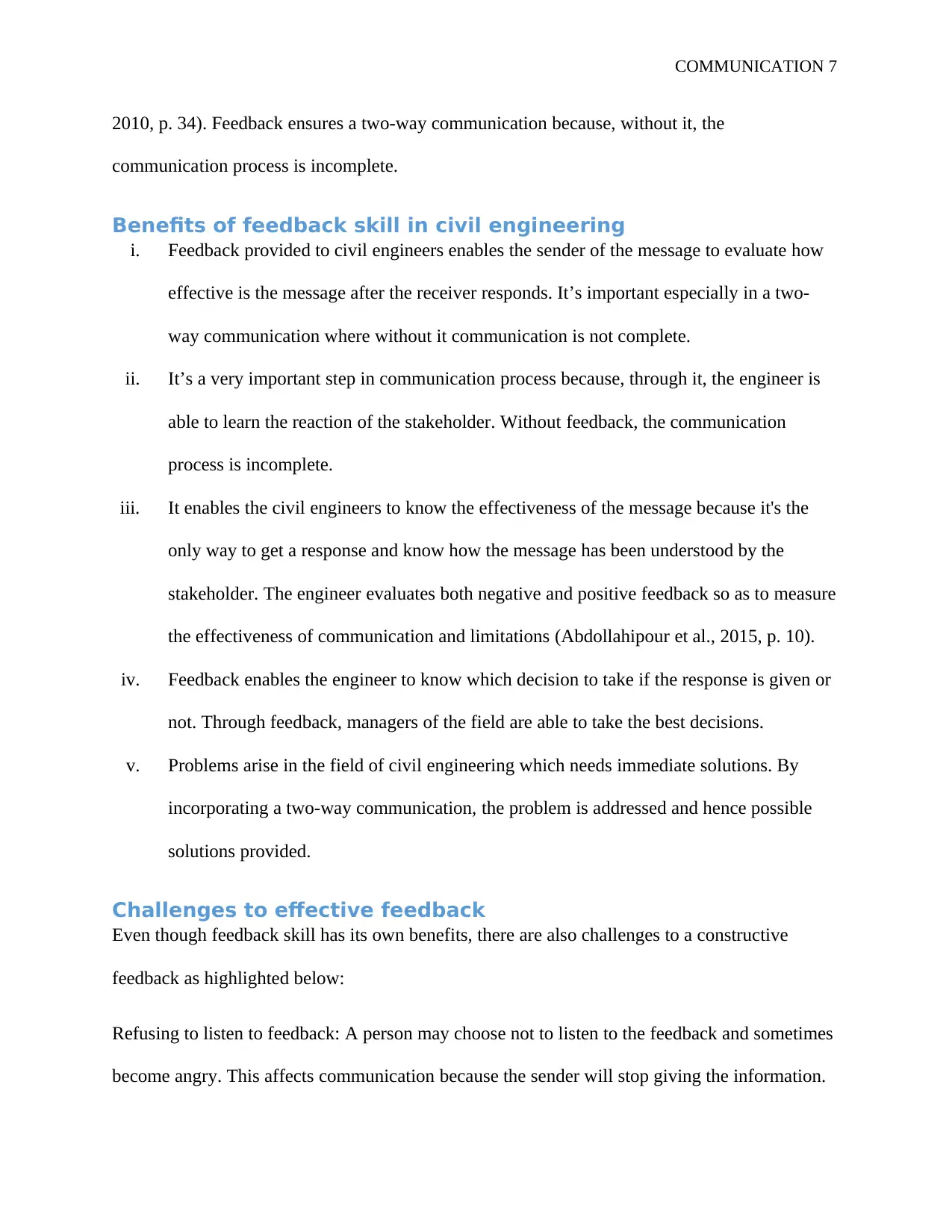
COMMUNICATION 7
2010, p. 34). Feedback ensures a two-way communication because, without it, the
communication process is incomplete.
Benefits of feedback skill in civil engineering
i. Feedback provided to civil engineers enables the sender of the message to evaluate how
effective is the message after the receiver responds. It’s important especially in a two-
way communication where without it communication is not complete.
ii. It’s a very important step in communication process because, through it, the engineer is
able to learn the reaction of the stakeholder. Without feedback, the communication
process is incomplete.
iii. It enables the civil engineers to know the effectiveness of the message because it's the
only way to get a response and know how the message has been understood by the
stakeholder. The engineer evaluates both negative and positive feedback so as to measure
the effectiveness of communication and limitations (Abdollahipour et al., 2015, p. 10).
iv. Feedback enables the engineer to know which decision to take if the response is given or
not. Through feedback, managers of the field are able to take the best decisions.
v. Problems arise in the field of civil engineering which needs immediate solutions. By
incorporating a two-way communication, the problem is addressed and hence possible
solutions provided.
Challenges to effective feedback
Even though feedback skill has its own benefits, there are also challenges to a constructive
feedback as highlighted below:
Refusing to listen to feedback: A person may choose not to listen to the feedback and sometimes
become angry. This affects communication because the sender will stop giving the information.
2010, p. 34). Feedback ensures a two-way communication because, without it, the
communication process is incomplete.
Benefits of feedback skill in civil engineering
i. Feedback provided to civil engineers enables the sender of the message to evaluate how
effective is the message after the receiver responds. It’s important especially in a two-
way communication where without it communication is not complete.
ii. It’s a very important step in communication process because, through it, the engineer is
able to learn the reaction of the stakeholder. Without feedback, the communication
process is incomplete.
iii. It enables the civil engineers to know the effectiveness of the message because it's the
only way to get a response and know how the message has been understood by the
stakeholder. The engineer evaluates both negative and positive feedback so as to measure
the effectiveness of communication and limitations (Abdollahipour et al., 2015, p. 10).
iv. Feedback enables the engineer to know which decision to take if the response is given or
not. Through feedback, managers of the field are able to take the best decisions.
v. Problems arise in the field of civil engineering which needs immediate solutions. By
incorporating a two-way communication, the problem is addressed and hence possible
solutions provided.
Challenges to effective feedback
Even though feedback skill has its own benefits, there are also challenges to a constructive
feedback as highlighted below:
Refusing to listen to feedback: A person may choose not to listen to the feedback and sometimes
become angry. This affects communication because the sender will stop giving the information.
Paraphrase This Document
Need a fresh take? Get an instant paraphrase of this document with our AI Paraphraser
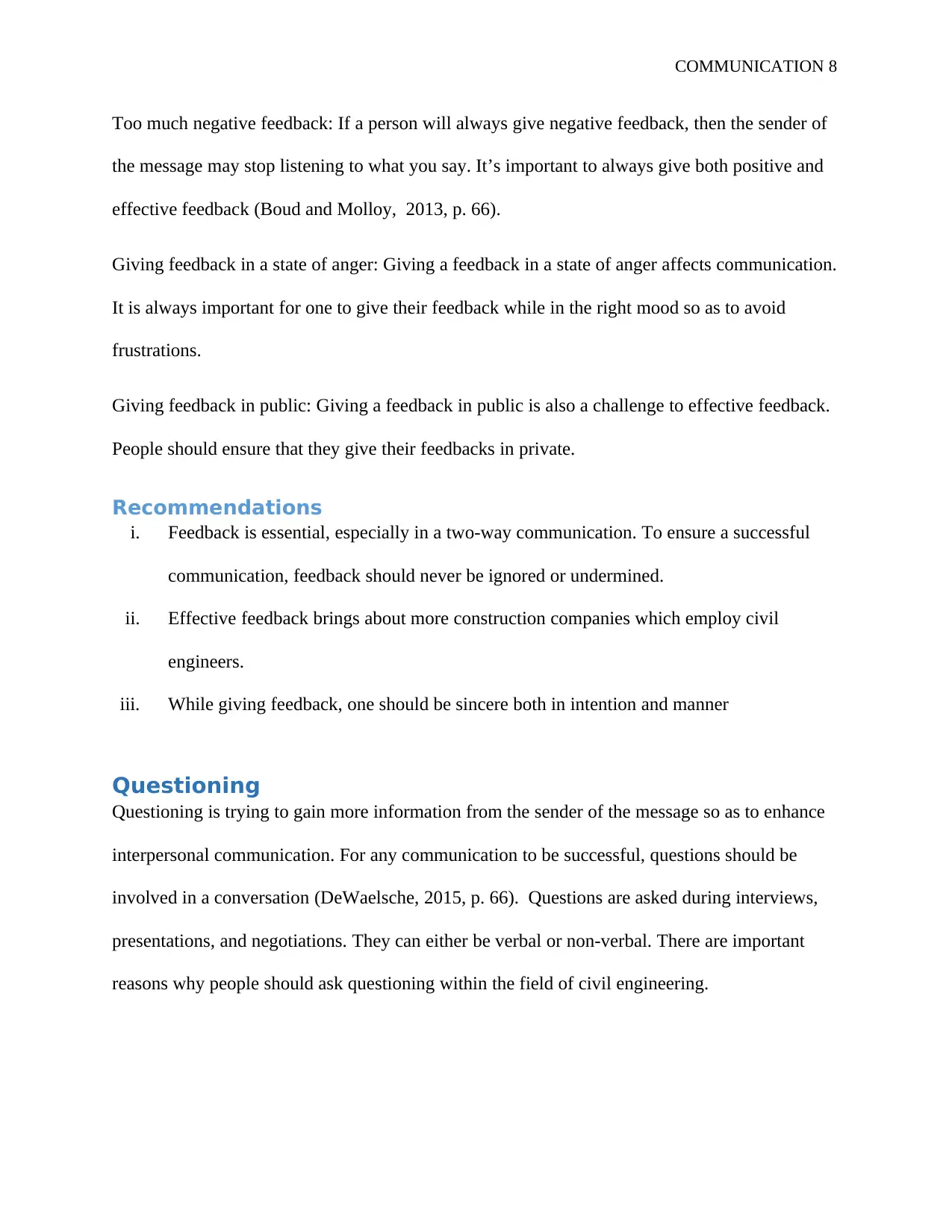
COMMUNICATION 8
Too much negative feedback: If a person will always give negative feedback, then the sender of
the message may stop listening to what you say. It’s important to always give both positive and
effective feedback (Boud and Molloy, 2013, p. 66).
Giving feedback in a state of anger: Giving a feedback in a state of anger affects communication.
It is always important for one to give their feedback while in the right mood so as to avoid
frustrations.
Giving feedback in public: Giving a feedback in public is also a challenge to effective feedback.
People should ensure that they give their feedbacks in private.
Recommendations
i. Feedback is essential, especially in a two-way communication. To ensure a successful
communication, feedback should never be ignored or undermined.
ii. Effective feedback brings about more construction companies which employ civil
engineers.
iii. While giving feedback, one should be sincere both in intention and manner
Questioning
Questioning is trying to gain more information from the sender of the message so as to enhance
interpersonal communication. For any communication to be successful, questions should be
involved in a conversation (DeWaelsche, 2015, p. 66). Questions are asked during interviews,
presentations, and negotiations. They can either be verbal or non-verbal. There are important
reasons why people should ask questioning within the field of civil engineering.
Too much negative feedback: If a person will always give negative feedback, then the sender of
the message may stop listening to what you say. It’s important to always give both positive and
effective feedback (Boud and Molloy, 2013, p. 66).
Giving feedback in a state of anger: Giving a feedback in a state of anger affects communication.
It is always important for one to give their feedback while in the right mood so as to avoid
frustrations.
Giving feedback in public: Giving a feedback in public is also a challenge to effective feedback.
People should ensure that they give their feedbacks in private.
Recommendations
i. Feedback is essential, especially in a two-way communication. To ensure a successful
communication, feedback should never be ignored or undermined.
ii. Effective feedback brings about more construction companies which employ civil
engineers.
iii. While giving feedback, one should be sincere both in intention and manner
Questioning
Questioning is trying to gain more information from the sender of the message so as to enhance
interpersonal communication. For any communication to be successful, questions should be
involved in a conversation (DeWaelsche, 2015, p. 66). Questions are asked during interviews,
presentations, and negotiations. They can either be verbal or non-verbal. There are important
reasons why people should ask questioning within the field of civil engineering.
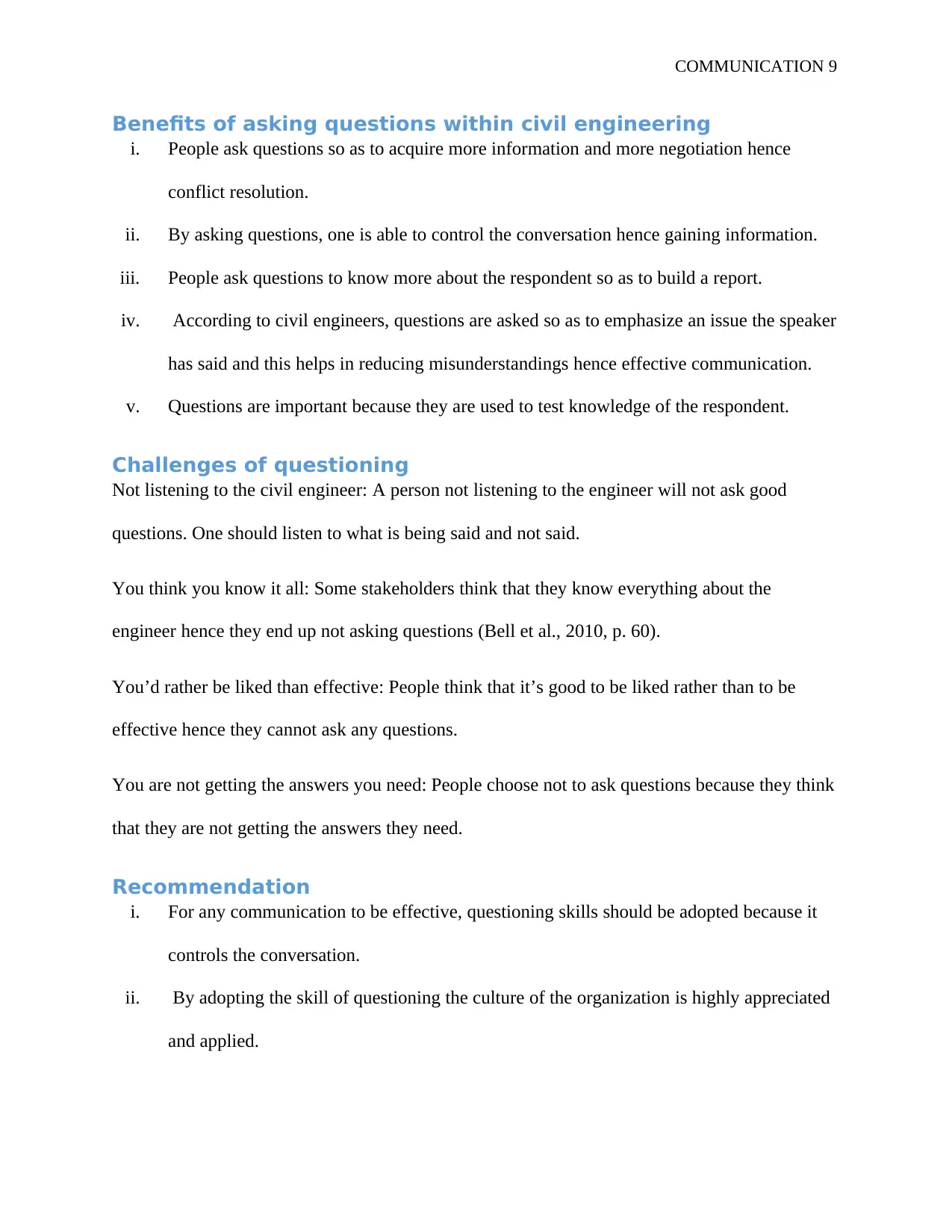
COMMUNICATION 9
Benefits of asking questions within civil engineering
i. People ask questions so as to acquire more information and more negotiation hence
conflict resolution.
ii. By asking questions, one is able to control the conversation hence gaining information.
iii. People ask questions to know more about the respondent so as to build a report.
iv. According to civil engineers, questions are asked so as to emphasize an issue the speaker
has said and this helps in reducing misunderstandings hence effective communication.
v. Questions are important because they are used to test knowledge of the respondent.
Challenges of questioning
Not listening to the civil engineer: A person not listening to the engineer will not ask good
questions. One should listen to what is being said and not said.
You think you know it all: Some stakeholders think that they know everything about the
engineer hence they end up not asking questions (Bell et al., 2010, p. 60).
You’d rather be liked than effective: People think that it’s good to be liked rather than to be
effective hence they cannot ask any questions.
You are not getting the answers you need: People choose not to ask questions because they think
that they are not getting the answers they need.
Recommendation
i. For any communication to be effective, questioning skills should be adopted because it
controls the conversation.
ii. By adopting the skill of questioning the culture of the organization is highly appreciated
and applied.
Benefits of asking questions within civil engineering
i. People ask questions so as to acquire more information and more negotiation hence
conflict resolution.
ii. By asking questions, one is able to control the conversation hence gaining information.
iii. People ask questions to know more about the respondent so as to build a report.
iv. According to civil engineers, questions are asked so as to emphasize an issue the speaker
has said and this helps in reducing misunderstandings hence effective communication.
v. Questions are important because they are used to test knowledge of the respondent.
Challenges of questioning
Not listening to the civil engineer: A person not listening to the engineer will not ask good
questions. One should listen to what is being said and not said.
You think you know it all: Some stakeholders think that they know everything about the
engineer hence they end up not asking questions (Bell et al., 2010, p. 60).
You’d rather be liked than effective: People think that it’s good to be liked rather than to be
effective hence they cannot ask any questions.
You are not getting the answers you need: People choose not to ask questions because they think
that they are not getting the answers they need.
Recommendation
i. For any communication to be effective, questioning skills should be adopted because it
controls the conversation.
ii. By adopting the skill of questioning the culture of the organization is highly appreciated
and applied.
⊘ This is a preview!⊘
Do you want full access?
Subscribe today to unlock all pages.

Trusted by 1+ million students worldwide
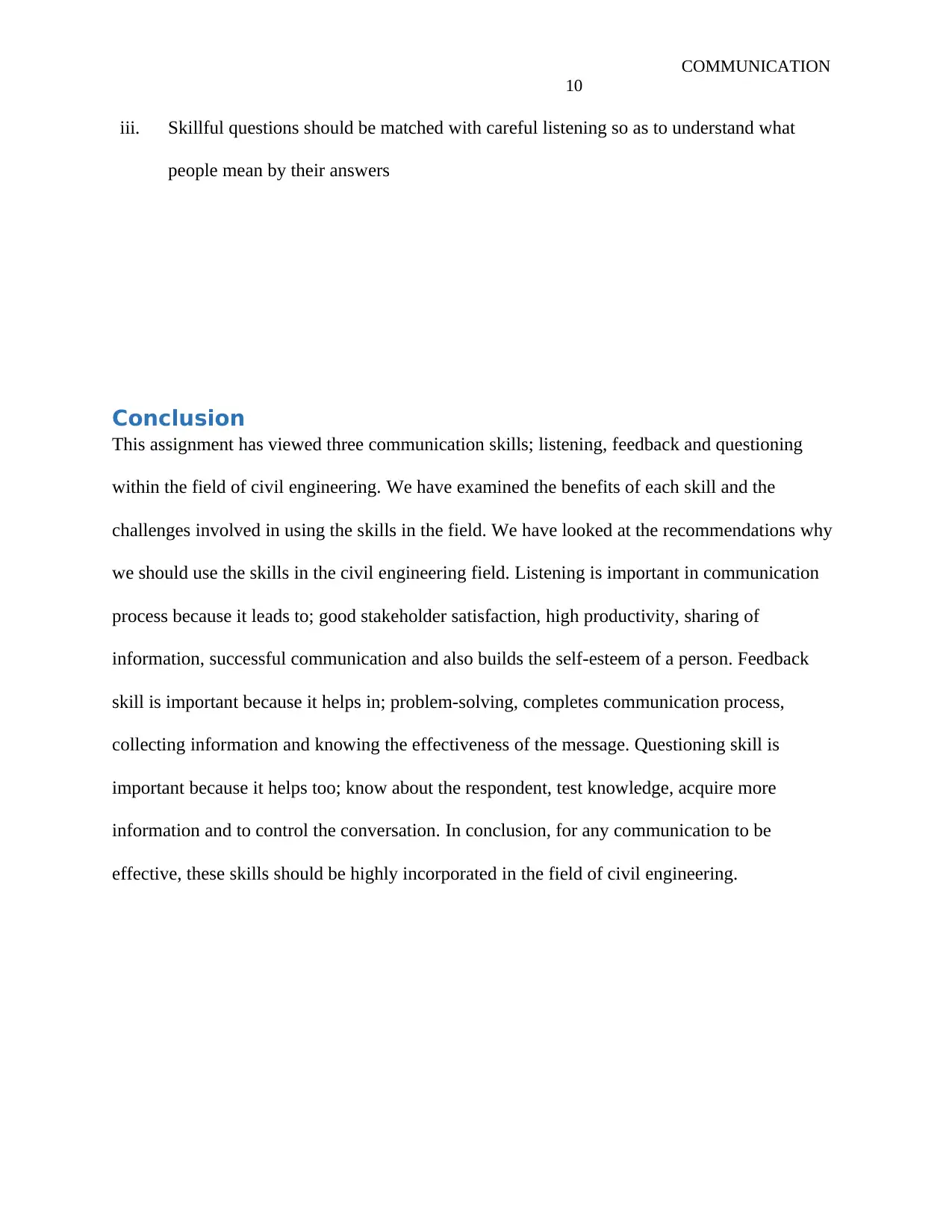
COMMUNICATION
10
iii. Skillful questions should be matched with careful listening so as to understand what
people mean by their answers
Conclusion
This assignment has viewed three communication skills; listening, feedback and questioning
within the field of civil engineering. We have examined the benefits of each skill and the
challenges involved in using the skills in the field. We have looked at the recommendations why
we should use the skills in the civil engineering field. Listening is important in communication
process because it leads to; good stakeholder satisfaction, high productivity, sharing of
information, successful communication and also builds the self-esteem of a person. Feedback
skill is important because it helps in; problem-solving, completes communication process,
collecting information and knowing the effectiveness of the message. Questioning skill is
important because it helps too; know about the respondent, test knowledge, acquire more
information and to control the conversation. In conclusion, for any communication to be
effective, these skills should be highly incorporated in the field of civil engineering.
10
iii. Skillful questions should be matched with careful listening so as to understand what
people mean by their answers
Conclusion
This assignment has viewed three communication skills; listening, feedback and questioning
within the field of civil engineering. We have examined the benefits of each skill and the
challenges involved in using the skills in the field. We have looked at the recommendations why
we should use the skills in the civil engineering field. Listening is important in communication
process because it leads to; good stakeholder satisfaction, high productivity, sharing of
information, successful communication and also builds the self-esteem of a person. Feedback
skill is important because it helps in; problem-solving, completes communication process,
collecting information and knowing the effectiveness of the message. Questioning skill is
important because it helps too; know about the respondent, test knowledge, acquire more
information and to control the conversation. In conclusion, for any communication to be
effective, these skills should be highly incorporated in the field of civil engineering.
Paraphrase This Document
Need a fresh take? Get an instant paraphrase of this document with our AI Paraphraser
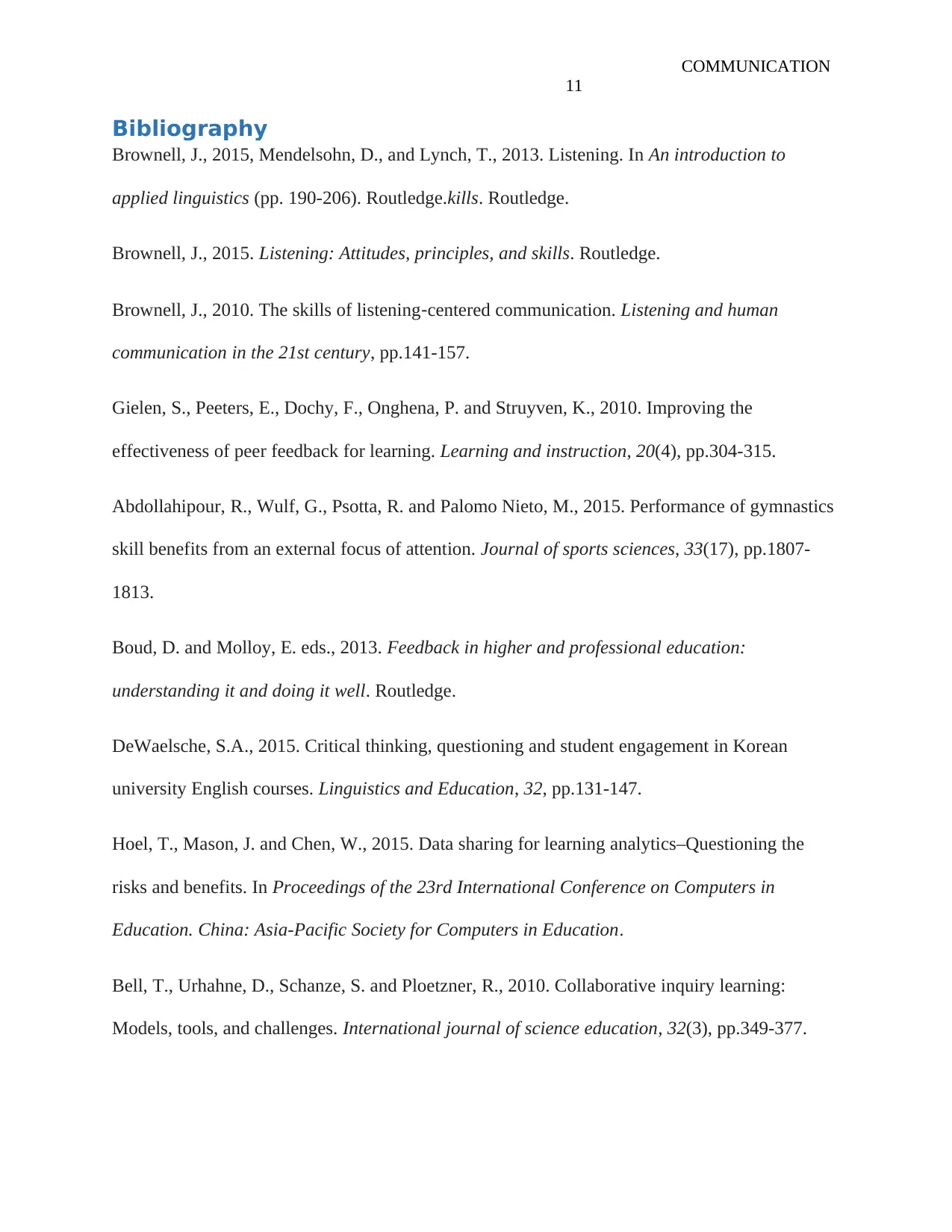
COMMUNICATION
11
Bibliography
Brownell, J., 2015, Mendelsohn, D., and Lynch, T., 2013. Listening. In An introduction to
applied linguistics (pp. 190-206). Routledge.kills. Routledge.
Brownell, J., 2015. Listening: Attitudes, principles, and skills. Routledge.
Brownell, J., 2010. The skills of listening‐centered communication. Listening and human
communication in the 21st century, pp.141-157.
Gielen, S., Peeters, E., Dochy, F., Onghena, P. and Struyven, K., 2010. Improving the
effectiveness of peer feedback for learning. Learning and instruction, 20(4), pp.304-315.
Abdollahipour, R., Wulf, G., Psotta, R. and Palomo Nieto, M., 2015. Performance of gymnastics
skill benefits from an external focus of attention. Journal of sports sciences, 33(17), pp.1807-
1813.
Boud, D. and Molloy, E. eds., 2013. Feedback in higher and professional education:
understanding it and doing it well. Routledge.
DeWaelsche, S.A., 2015. Critical thinking, questioning and student engagement in Korean
university English courses. Linguistics and Education, 32, pp.131-147.
Hoel, T., Mason, J. and Chen, W., 2015. Data sharing for learning analytics–Questioning the
risks and benefits. In Proceedings of the 23rd International Conference on Computers in
Education. China: Asia-Pacific Society for Computers in Education.
Bell, T., Urhahne, D., Schanze, S. and Ploetzner, R., 2010. Collaborative inquiry learning:
Models, tools, and challenges. International journal of science education, 32(3), pp.349-377.
11
Bibliography
Brownell, J., 2015, Mendelsohn, D., and Lynch, T., 2013. Listening. In An introduction to
applied linguistics (pp. 190-206). Routledge.kills. Routledge.
Brownell, J., 2015. Listening: Attitudes, principles, and skills. Routledge.
Brownell, J., 2010. The skills of listening‐centered communication. Listening and human
communication in the 21st century, pp.141-157.
Gielen, S., Peeters, E., Dochy, F., Onghena, P. and Struyven, K., 2010. Improving the
effectiveness of peer feedback for learning. Learning and instruction, 20(4), pp.304-315.
Abdollahipour, R., Wulf, G., Psotta, R. and Palomo Nieto, M., 2015. Performance of gymnastics
skill benefits from an external focus of attention. Journal of sports sciences, 33(17), pp.1807-
1813.
Boud, D. and Molloy, E. eds., 2013. Feedback in higher and professional education:
understanding it and doing it well. Routledge.
DeWaelsche, S.A., 2015. Critical thinking, questioning and student engagement in Korean
university English courses. Linguistics and Education, 32, pp.131-147.
Hoel, T., Mason, J. and Chen, W., 2015. Data sharing for learning analytics–Questioning the
risks and benefits. In Proceedings of the 23rd International Conference on Computers in
Education. China: Asia-Pacific Society for Computers in Education.
Bell, T., Urhahne, D., Schanze, S. and Ploetzner, R., 2010. Collaborative inquiry learning:
Models, tools, and challenges. International journal of science education, 32(3), pp.349-377.

COMMUNICATION
12
Puccio, G.J., Mance, M. and Murdock, M.C., 2010. Creative leadership: Skills that drive
change. Sage Publications.
12
Puccio, G.J., Mance, M. and Murdock, M.C., 2010. Creative leadership: Skills that drive
change. Sage Publications.
⊘ This is a preview!⊘
Do you want full access?
Subscribe today to unlock all pages.

Trusted by 1+ million students worldwide
1 out of 13
Related Documents
Your All-in-One AI-Powered Toolkit for Academic Success.
+13062052269
info@desklib.com
Available 24*7 on WhatsApp / Email
![[object Object]](/_next/static/media/star-bottom.7253800d.svg)
Unlock your academic potential
Copyright © 2020–2025 A2Z Services. All Rights Reserved. Developed and managed by ZUCOL.





